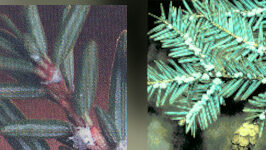The hemlock woolly adelgid (Adelges tsugae Annand), is a small aphid-like insect that feeds on several species of hemlock (Tsuga). It was introduced to North America from Asia, and has been recognized in the United States since at least 1924. By sucking sap from the young twigs, the insect slows or prevents tree growth, causing needles to discolor from deep green to grayish green and to drop prematurely. The loss of new shoots and needles seriously impairs tree health. Defoliation and tree death can occur within several years. It is a serious threat to the hemlocks not only of Hemlock Gorge, but all of New England.
It has advanced into Southern Massachusetts, and it has appeared in the Gorge and in nearby forest. The threat it poses is serious, and the Friends of Hemlock Gorge are working with the MDC to develop a strategy. The approval of $60,000 by the legislature (July 31, 2000) to grow and release ladybugs holds out the promise that meaningful control may be achieved in time to save some of the hemlocks in the reservation.
Further Information:
- The USDA has a comprehensive web site for the adelgid
- Legislation: The first bill proposed to help combat the Adelgid in the gorge. It led to the appropriation of $60,000 for predator ladybugs on July 31, 2000.
- The National Association of Conservation Districts has published an encouraging note (June 1998) on the use of a ladybug strain to control the adelgid.
- The plans of Harvard University’s Arnold Arboretum to combat the adelgid (1999)
- Acadia National Park has a detailed profile on the insect, its dangers, and containment methods.
- Scientist Mark McClure of the Connecticut Agricultural Experiment Station in Windsor has a site at https://www.state.ct.us/caes/fsen012f.htm. It details control methods other than the use of the ladybugs.
- James Rhea of the USDA summarizes the economic and environmental impact of the adelgid at https://info.metla.fi/iufro95abs/d2pap107.htm, but the report is old (1995).
- The Hemlock Woolly Adelgid Newsletter is a service of the USDA Forest Service, Northeastern Area in support of the Adelgid Working Group. Their excellent 1998 newsletter is at http: https://www.fs.fed.us/na/morgantown/fhp/hwa/hwa3.htm
- The US Forestry Service also put out a newsletter in 1996 that provides other information on the pest.
- The Virginia Tech Cooperative Extension also offers a brief review and bibliography, but it is dated (1996).
- The Vermont Entymology Research page and the USDA have good photographs of the adelgid.
- New York State has an active surveillance program. See https://extapps.dec.ny.gov/docs/lands_forests_pdf/hwafactsheet.pdf.
Finally, we have a news story on the adelgid published by the State House News Service in September, 2000 and reprinted here with the permission of the author.
A solution may be at hand for the woolly adelgid, but the battle is far from won. If you share our concern with the Woolly Adelgid, please consider participating in, and contributing to, the activities of the Friends of Hemlock Gorge.
Articles mentioning this topic:
Meeting Minutes: May 4, 1999
Next Meeting: Tuesday June 1, 1999 at 7:15 Present on May 4 were: Brian Yates, Ken Newcomb, Bobbi Demers, Hank Lysaght, John Mordes, Nina Koch, Carol McPherson, Hannah Sherman. Brian began by circulating the Tab‘s article about Clean-Up. We congratulated ourselves on the success of the day’s work. John Mordes and Brian did attend the…
Meeting Minutes: April 6, 1999
Next Meeting: Tuesday May 4, 1999 at 7:15 Present were: Brian Yates, Ken Newcomb, Kevin Hollenbeck, Bobbi Demers, John Mordes, Vaunita Schnell, Bruce Conrad, Carol McPherson, and Hannah Sherman. Brian showed letters from Sen. Creem to MDC chief David Balfour, urging the spending of money to combat the Woolly Adelgid. His reply indicated willingness to…
Legislation Proposed in 1999
H 3333 AN ACT RELATIVE TO ECHO BRIDGE. Be it enacted by the Senate and House of Representatives in General Court assembled, and by the authority of the same, as follows:SECTION 1. Notwithstanding any general or special law to the contrary, any funds received for the lease of the former Massachusetts Highway Department depot at…

